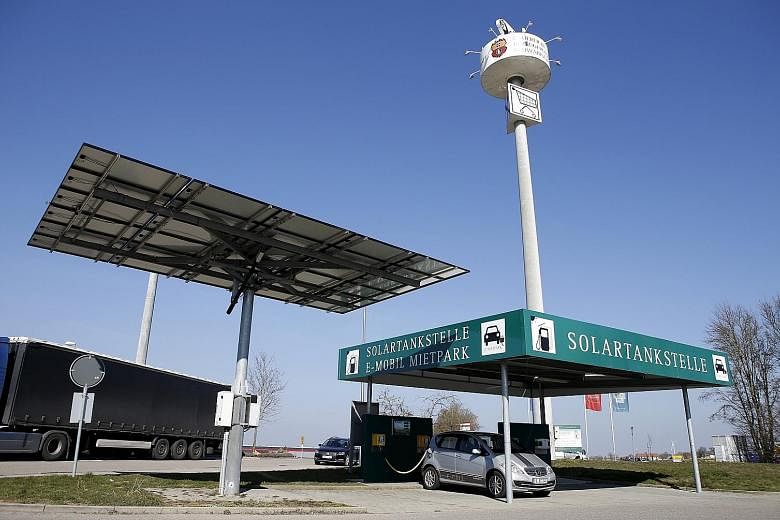German Chancellor Angela Merkel's government has reached a deal with carmakers to jointly spend €1.2 billion (S$1.8 billion) on incentives to boost sluggish electric car sales.
Buyers will be able to receive as much as €4,000 in rebates to help offset the higher price of an electric vehicle, Finance Minister Wolfgang Schauble said at a recent press conference in Berlin.
Purchasers of hybrid cars will get as much as €3,000 off the price. The industry will shoulder 50 per cent of the cost.
"The goal is to move forward as quickly as possible on electric vehicles," Mr Schauble told reporters, adding that the aim is to begin offering the incentives next month. "With this, we are giving an impetus."
The car industry, the country's biggest manufacturing sector based on revenue, sees incentives as a potential game changer due to the size of the German market, which accounts for nearly a quarter of all auto sales in Europe.
Chancellor Merkel, who hinted in February that she was ready to back subsidies to reach her goal of one million electric cars on German streets by 2020, sealed the agreement with automotive chief executive officers late on Tuesday after weeks of discussions over how to divide the funding. The industry originally offered to pay 25 per cent of the total.
Just more than 30,000 electric vehicles, which are more expensive than conventional models, have been sold in Germany. That is a tiny fraction of the more than three million cars bought each year in a country which has historically leaned on diesel technology to reduce emissions.
Volkswagen, Daimler and BMW, along with their suppliers such as Continental, directly employed 790,000 people last year, with industry sales totalling €404 billion last year, according to the VDA German carmakers' association.
Production in Germany totalled 5.7 million cars last year, up 1.9 per cent, for models such as the Mercedes-Benz S-Class sedan made near Stuttgart and the Audi A3 sedan built in Ingolstadt.
Carmakers are "one of the key lead industries and it doesn't help if we leave it completely on its own" in global competition, Vice- Chancellor Sigmar Gabriel said at the Berlin event, comparing the electric car incentives to the subsidies European governments gave years ago to help build Airbus Group.
Car executives point to France, where the government last year started offering a €10,000 rebate to drivers trading in diesel-powered cars older than 14 years, and Norway as examples of how governments can aid in the development of the market for green technology.
In Norway, electric cars enjoy a plethora of perks. There is no value- added tax on purchases or a one- time fee imposed on regular cars. There is also free battery charging, free parking and an exemption from congestion charges.
On top of that, electric car owners are allowed to drive in bus lanes to avoid traffic.
In throwing her support behind the programme, the German chancellor is walking a tightrope within her governing bloc. While some - such as the head of the Bavarian sister party to her Christian Democratic Union, Mr Horst Seehofer - favour incentives to spur sales and create jobs, many others have expressed their opposition to such measures.
BLOOMBERG

